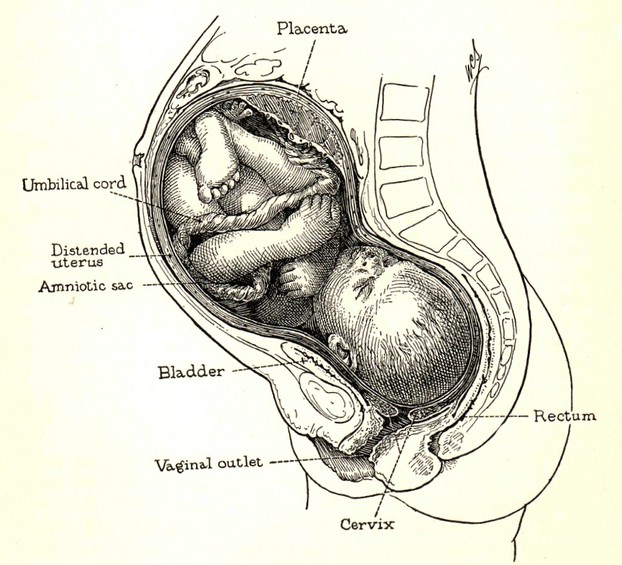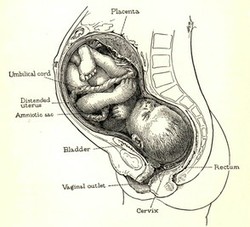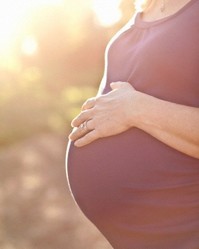
Low Lying Placenta - Problems, Precautions & Symptoms
by wrylilt
A low lying placenta is not uncommon - but of course it can cause worries for any pregnant woman. So what is it, will the baby be ok, and can it cause abdominal pain or bleeding?
You can start early on getting the birth you want. Check out this guide on having a shorter labor.
What is a placenta?
The placenta is a flat, rounded organ that grows on the wall of the uterus during pregnancy. The placenta is connected directly to the mother's uterine wall and connected to the baby via the umbilical cord.
The placenta serves as a channeling point between mother and baby - exchanging nutrients, blood, waste and gas between the two, so the baby can grow properly during the pregnancy.
Because the placenta takes the place of many of the baby's vital functions, including breathing, the placenta needs to remain intact throughout the labor and delivery, so that the baby can survive the journey to the outside world.
Once the mother gives birth, the placenta is no longer needed, so it is passed out after the baby, usually fairly painlessly.
What is a low lying placenta, and why is it a problem?
The optimal position for a placenta is at the top of the uterus, on the back wall.
A placenta at the back of the womb is called posterior, while a placenta at the front of the womb is called anterior.
Although placentas will normally develop in the correct location at the top back of the womb wall, in a small number of pregnancies the placenta grows lower in the womb, or at the front of the womb.
When the placenta is at a position within 3cm (approx 1.2 inches) of the cervix, it's referred to as a low lying placenta.
Unlike placenta previa (where the placenta completely or partially covers the cervical opening), a low lying placenta often moves up on its own.
In fact, in 95% of cases where the mother has a low lying placenta, the placenta will move up into a higher position, leading to a completely normal birth.
However, in 5% of cases, the placenta will either move down or remain in its current position, which can often result in the mother needing to have a cesarean section. The reason for this is because if the placenta is delivered first, the baby will have no life support system or oxygen during the birthing process, meaning they may die during the delivery.
 The best position for a placenta - Top Posterior (At the top, back of the uterus.) |
What will my doctor do if I have a low lying placenta?
Usually a low lying placenta will be identified at either the 12 week dating ultrasound or your 18-20 week checkup ultrasound.
Unless the doctor is extremely worried about the position of the placenta, or you have a high risk pregnancy, the doctor is unlikely to do anything at this stage except book another ultrasound.
Usually the ultrasound will be booked for somewhere between 32-34 weeks, because the womb expands a great deal during the third trimester, meaning the uterus often moves up and out of the danger zone by this stage in the pregnancy.
However, if the placenta is still lying low, or has moved down further, your doctor may book you in for a cesarean section at this stage. If he wants to be doubly sure, he may book another ultrasound for the last few weeks of pregnancy, but if there is no indication of the placenta moving up, the safest way to deliver the baby is via surgery.
Do I have to take any special precautions with a low lying placenta?
This is a common question - and one that varies depending on how low your placenta is lying, your medical history, and your medical carer's opinion.
If the placenta is 2-3cm from the cervical opening, then usually it's not considered an extremely big problem. As long as you don't have any other medical problems or a history of high risk pregnancies, going about your normal activities including sexual intercourse is usually not a problem.
However, if the placenta is lying closer than 2cm to the opening of the cervix, your doctor may ban you from strenuous activities or even put you on bed rest. This is something you really need to discuss with your doctor personally.
Remember - no matter how far away the placenta is, you should contact your doctor or a hospital if you experience any unusual discharge or bleeding.
Can a low lying placenta cause abdominal pain?
In most cases, a low lying placenta will not cause any pain or other sensations that can't be explained as other pregnancy symptoms. However it may cause some minor spotting.
Abdominal pain in pregnancy is not uncommon and can be due to a number of causes - including normal muscle stretching, baby movement or sciatica.
Of course, if you experience any severe pain, no matter what you think the cause may be, it's important to either call your doctor or visit the emergency department.
You might also like
Tips for a Healthy PregnancyPregnancy tips, healthy tips, pregnancy, first time mothers, tips for pregnan...
Foods to avoid during pregnancyWhile pregnant, there are certain foods that can be harmful to either the mot...




 Do Solar Panels Work in Cloudy Weather or at Night?on 09/16/2020
Do Solar Panels Work in Cloudy Weather or at Night?on 09/16/2020
 Keyword Research - The Pitfalls, The Methods & How To Rank In Google For Freeon 04/21/2012
Keyword Research - The Pitfalls, The Methods & How To Rank In Google For Freeon 04/21/2012
 Are You Getting Married Too Young? Should You Wait?on 08/29/2012
Are You Getting Married Too Young? Should You Wait?on 08/29/2012
 Maplestory Islanders - What Are They & What's The Challenge?on 09/02/2012
Maplestory Islanders - What Are They & What's The Challenge?on 09/02/2012


Comments
I am in same problem. My age is 40. This is my third time pregnancy. Doctor says its a big problem. I can't do any sex with my husband. And surgery time my ovary will cut down. I am afride with this .
What can I do?
Hi good night I'm 22 weeks pregnant n I also have a low laying placenta. At the moment I'm having a discomfort pain not contractions but it's a bit uncomfortable I can bare the pain. I'm going to do an ultrasound tomorrow to see if everything is fine but should I go emergency now or is this pain nrml.cuz it's bearable.
Emma,
Yes phone the midwife asap. At best, everything will be Ok and she will reassure you. If anything is wrong she can sort it. So contact your midwife and get support .
I am only 19 years old,found out at 22weeks I have a low lying placenta and now at 28weeks I been having pain when I walk,should I tell my midwife
Can one travel safely in 2nd AC train having diagnosed with low lying placenta taking adequate precaution a distance of 200km...
Hello Dr.
My wife is pregnant by 18 weeks with low lying placenta. She had heavy bleeding in previous by 2 times and in the last time she took 1 bag blood. Now she is suffering by discharging continuous radish fluid, little amount blood. Our tension is about fluid as it is very few but what is it?
Dear doctor I am 40 years old and five months pregnant. I have low lying placenta which caused heavy bleeding twice in my third and fourth month. I am a working lady and the doctor had suggested me to avoid strenuous schedule. I've heard that in most of the cases there is a delivery in the 6 th month. How can it be avoided. Please suggest me.
Hello Doctor,
I am a 20 weeks pregnant now and had anomoly scan and told that my placenta is anterior low about 12 mm and asked me to take bed rest and not to travel. But I am in a situation where I can't leave my job for that I need to travel for 20 min for both up and down by a car and I dnt have any work pressure also... And will be staying in office for 9 hours among that I will be relaxing for half nd hour for each three hours and after comming home I am completely lying on the bed.. can I continue to work and do I need to take any other precautions ? Please suggest me with proper solution... Thank s in advance..
I had a low lying placenta detected at my 19th week when I bleed and rush me to the hospital. My doc advise me to rest with no heavy lifting no long distance walk and long walking and no contact. Now on my 22nd week with spotting and discharge sometimes when I'm stress at work, but I rest a lot and thank God for as of now my baby is safe. Can I now have a contact with my partner coz this hormone is really driving me crazy..
I had placenta previa in a previous pregnancy and had c-sections at six month ago .Sorry to say that i had lose my baby at 30 weeks of pregnancy with suddenly water broke.Now i want to conceive baby again. Please tell me is there any possibility of low lying placenta and premature delivery...? And also give me some advice which is helpful for my next time pregnancy.